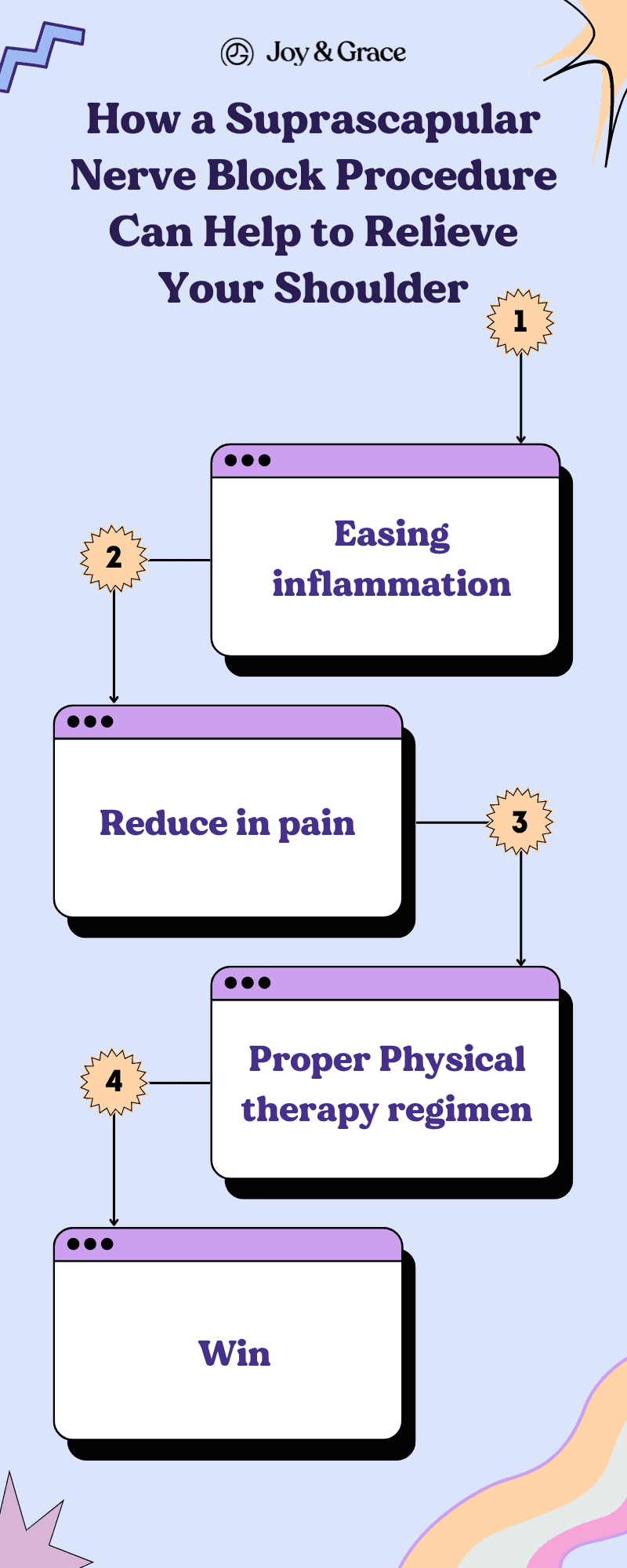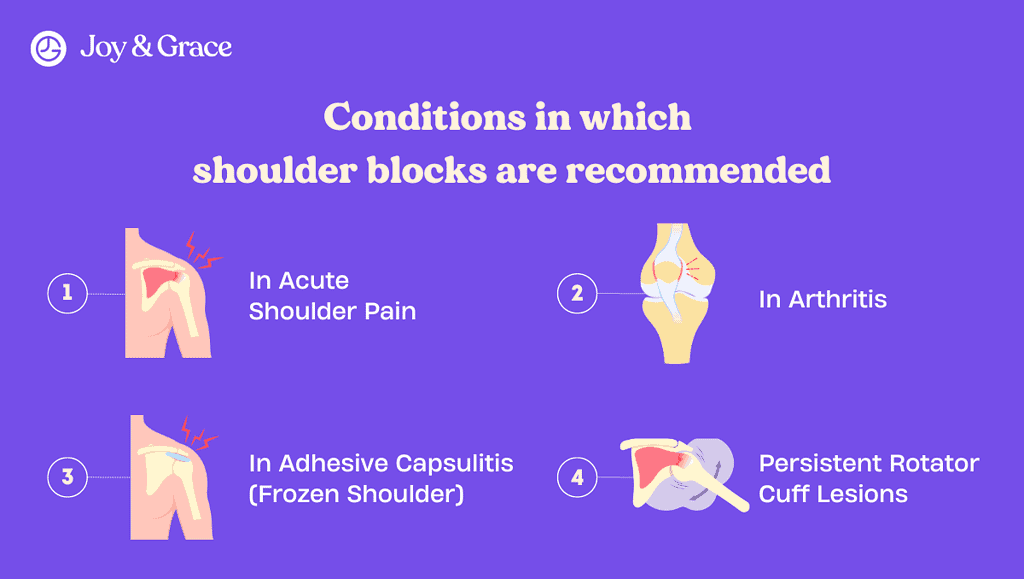Simply put, nerve blocks are procedures in which doctors try to suppress the function of various nerves by (usually) injecting medicines around them.
When this is done in the shoulder, the main goal of this procedure is most commonly pain relief.
But that’s not all there is to it.
Shoulder nerve blocks are also an important part of shoulder surgery. They provide a total loss of feeling during the surgery and pain relief after the surgery. In addition, shoulder nerve blocks can also be used as a diagnostic method to help exclude some rare diseases.
However, our goal is not to review all of these roles in detail.
In this article, our main focus is to show how shoulder nerve blocks are particularly helpful in chronic pain relief or management.
However, throughout the article, we will also briefly discuss shoulder nerve blocks as a diagnostic procedure as well. And towards the end of the article, we will discuss their role in shoulder surgery.
What Is A Suprascapular Nerve Block?
A suprascapular nerve block is a medical procedure. It has proven to be an effective way to relieve chronic pain and acute post-surgical shoulder pain.
It involves injecting pain-relieving medicines inside the shoulder joint around the suprascapular nerve.
Many nerves provide feeling to the shoulder. But the suprascapular nerve is usually chosen for a shoulder nerve block to treat long-term pain.
This is because the suprascapular nerve block works well to relieve pain and has the fewest side effects of all shoulder nerve blocks.
Because of these things, "shoulder nerve block" and "suprascapular nerve block" are almost the same when it comes to chronic pain. So, you may see these two words being used interchangeably throughout the text.
Why Do I Need A Shoulder Nerve Block?
Shoulder (suprascapular) nerve blocks are usually considered after you have undergone conservative treatment. They are also an option if you are unwilling or unfit for surgical intervention in the shoulder.
This means suprascapular nerve blocks are usually not the first-line treatment for chronic pain.
Also, despite being an excellent pain relief option, they are usually not a permanent treatment. This is because they don’t directly heal the lesion or injury.
Some of the diseases in which suprascapular nerve blocks may be helpful include:
- Inflammatory arthritis,
- Rheumatoid arthritis,
- Adhesive capsulitis,
- Rotator cuff tendonitis.
This procedure has also been reported to be helpful for pain caused by bursitis, degenerative disease, stroke, or trauma.
In addition to pain management, suprascapular nerve blocks are also used as a diagnostic procedure, as we mentioned in the beginning.
This applies especially to cases of shoulder pain due to suprascapular neuropathy.
Also known as suprascapular nerve entrapment, this condition can result in shoulder pain, weakness, or both.
The most common cause is repeated stretching of the suprascapular nerve, which usually happens when the shoulder moves up and down and back and forth repeatedly.
As you can see, only one nerve, the suprascapular nerve, is hurt and produces shoulder pain in this condition. That means that, if this nerve was to be blocked, no pain would be produced.
So, doctors might try a suprascapular nerve blockade to simply "turn off" this nerve and see if the pain goes away.
Pain still continuing after the procedure means other nerves are also causing the pain, so sole suprascapular neuropathy can be excluded.
That’s how suprascapular nerve blocks work as a diagnostic procedure.
With that being said, athletes are most likely to have symptoms of suprascapular neuropathy, particularly baseball, volleyball, swimming, weightlifting, and tennis players (sports that require a lot of overhead activity).
However, it is a rare condition. It is believed to be diagnosed in less than 0.4% of all people with shoulder pain.
What Type Of Medicines Are Used In Suprascapular Nerve Block?
Suprascapular nerve blocks involve injecting a local anesthetic and a steroid into the shoulder joint. The anesthetic immediately numbs the pain, giving you quick comfort. Afterward, the steroid will work at a prolonged rate to reduce inflammation and calm the nerves.
How a Suprascapular Nerve Block Procedure Can Help to Relieve Your Shoulder

Shoulder (suprascapular) nerve blocks work by easing inflammation. They also block sensory nerve fibers, which send pain signals to the brain.
Earlier, we mentioned that suprascapular nerve blocks don’t directly heal the shoulder. Nevertheless, sometimes easing inflammation is all it takes.
This is especially true in illnesses like arthritis. Arthritis frequently presents with episodes of relapse and remission. And by controlling inflammation, nerve blocks can help you function in everyday activities.
On the other hand, it is also well-known that pain is a significant factor in shoulder mobility. And if you can’t properly move your shoulder, treatment measures such as physical therapy become very difficult.
By blocking pain, shoulder nerve blocks offer an additional benefit. They allow proper physical therapy to be engaged. That means that by the time medicines wear off; you might have a healthier shoulder overall.
Many studies have thoroughly reported these mentioned benefits of suprascapular nerve blocks.

In Acute Shoulder Pain
Suprascapular nerve blocks are usually performed to relieve acute pain after shoulder surgery. We will be discussing this in detail later in the article.
In Arthritis
Inflammatory and rheumatoid arthritis are well known for causing chronic shoulder pain.
To find out if a suprascapular nerve block is helpful in these patients, a research group in South Australia conducted a study. Sixty-seven patients suffering from arthritis were selected.
After suprascapular nerve blockade, pain levels were measured and reported after 4, 8, and 12 weeks. And the results were very promising.
It turned out that patients declared pain relief for up to 12 weeks after the procedure. The study included scenarios such as pain at night, pain on movement, and pain at rest.
In Adhesive Capsulitis (Frozen Shoulder)
Frozen shoulder is also known as adhesive capsulitis. It is characterized by painful and severely limited shoulder motion.
A study with a small group of 30 patients attempted to compare the outcomes of shoulder nerve blocks for adhesive capsulitis.
Researchers discovered that suprascapular nerve blocks quickly induced pain relief in these patients. Additionally, there was a noticeably better shoulder function. These results persisted for about three months.
Persistent Rotator Cuff Lesions
Rotator cuff tendinitis is a common cause of shoulder pain in adults.
Conservative management is effective for many patients. However, considerable symptoms may linger. In one long-term follow-up study, about 26% of patients still had symptoms of severe shoulder pain 12 months after the pain first showed up.
In this group of people with symptoms that don't go away, suprascapular nerve blocks have been shown to help with pain and improve range of motion.
The therapeutic benefit lasts only for a period of time (4–12 weeks), but it can easily be repeated.
Patients with rotator cuff tears who are waiting for surgery can also get relief from the pain with suprascapular nerve blocks.
Can There Be Any Complications Or Risks?
Suprascapular nerve blocks are widely regarded as very safe procedures. However, there are some complications and risks you should know about.
- Common risks include:
- Bruising at the injection site.
- A worsening of your pain (however, this should pass quickly).
- After the injection, your neck and shoulder can be stiff or uncomfortable for 24 to 48 hours.
- Arm numbness or weakness; this condition should pass in three to four hours.
- Rare risks include:
- Anaphylaxis, which is a severe medication allergy reaction.
- Lung puncture. The chances of this happening are very low; however, this is a severe complication. If you have trouble breathing after the procedure, you should go to the nearest emergency room right away.
- Risks related to steroids
When used in shoulder nerve blocks, steroid injections have fewer side effects compared to taking steroids by mouth all the time. However, their use can still cause some systemic effects you should know about:
- If you have diabetes, you should closely monitor your blood sugar because it may slightly increase for up to two weeks. If you experience any issues, speak with your doctor.
- If you have heart failure, salt and water retention may cause you to breathe more quickly. If you are having any issues, speak with your doctor or nurse.
- If you have diabetes, you should closely monitor your blood sugar because it may slightly increase for up to two weeks. If you experience any issues, speak with your doctor.
What To Expect During The Procedure
The procedure is done in an outpatient setting (without having to spend the night at the hospital). However, there are some things you should be aware of before and during the procedure. Here are the main points.
Before The Procedure:
- You may need to stop taking blood thinners (except aspirin) at least one week before the procedure. Quitting smoking is also advisable for some weeks before the procedure.
- You will need to arrange for someone to drive you home afterward, and it is also a good idea to arrange to have someone with you overnight.
- You should empty your bladder before the procedure.
The Day Of The Procedure
- The hospital will inform you whether you can eat and drink before the procedure. This step depends on whether the doctors choose to use general sedation or not.
- You may be at the appointment for between two to four hours.
- Upon arrival, a nurse will check that you are fit for the procedure, and your doctor will see you and answer any questions or queries you might have. You will then be asked to sign your consent form.
- The procedure is usually done while you’re awake. However, you may be asked to put on a hospital gown.
- To allow the doctor to do the procedure, you must lie or sit in a suitable position. Someone on staff will probably assist you if you need assistance entering this position.
- As mentioned earlier, some hospitals may also place a cannula (plastic needle) into a vein in your hand to give you sedation. This will make you sleepy and relaxed but still conscious. However, some hospitals don’t use sedation, so it would probably be a good idea to discuss this with the doctor before the procedure.
- Antiseptic will be used to clean the skin around the site of the injection (this means you should not put any creams or rubs on the day of your treatment).
- The doctor will administer a local anesthetic to numb the skin around the injection site.
- The doctor will then administer the injection. An X-ray machine could be used as a guide for this. Although it could feel uncomfortable, it shouldn't hurt too much. However, it is essential that you keep still in this step.
- The complete process usually takes five to twenty minutes.
- The injection site will be covered by a thin plaster, which may be removed in 24 hours. However, you shouldn’t be concerned if it comes off sooner.
What Happens After The Procedure?
- Doctors will usually observe you for 30 minutes in the recovery area as you could feel a little sleepy and drowsy.
- After providing you with some small refreshments, you may be released to go home.
- As we stated earlier, you must be given a ride home, as you should not drive or use public transportation.
Days After The Procedure:
- But it usually takes between 24 and 72 hours for the steroid drug to start working, and it could take up to a week to see the full benefits.
- You may feel transient numbness and weakness in the treated shoulder. Thus, you should be cautious and protect the shoulder until normal sensation returns in order to reduce the risk of accidents.
- You should slowly increase your level of activity. However, it is only advisable to start new exercises once your muscles have had time to adjust to the ones you are already doing.
- By gradually getting more active, your muscles can regain some of their lost strength. You should be aware that if you don’t work on strengthening your muscles, the injections might only help you for a short time. Because as we mentioned earlier, the injection itself isn't a cure
Do nerve Block Injections Wear Off?
Nerve block injections indeed wear off after some time. Depending on how much irritation or inflammation there is, the steroid part of the injection may keep working for 1 to 6 months.
However, that doesn’t mean the pain will automatically arise as soon as nerve injections wear off.
As we discussed this earlier, chronic shoulder pain may not be constant. Times when the pain gets worse are usually caused by increased inflammation.
If you combine nerve block injections with physical therapy, you should still feel better after the injections wear off.
Can A Nerve Block Cause Permanent Numbness?
Permanent numbness could only happen if the shoulder nerve gets hurt during the procedure.
Although reported to be very rare, no studies exist with concrete numbers.
Can Pain Get Worse After A Nerve Block?
As we stated earlier, the pain might get worse for a short period of time right after the procedure. Nevertheless, shoulder nerve blocks themselves can not cause pain to worsen in the long run.
However, the disease you’re suffering from may progress, causing pain to worsen over time. This is especially the case in conditions that don’t respond to physical therapy and may need surgical intervention.
Shoulder Nerve Blocks For Shoulder Surgery

Earlier, we discussed how shoulder nerve blocks could be an option for you if you don't want to (or can't) get surgery on your shoulder.
Yet, surgical intervention remains the only proper cure for shoulder pain in some cases. And besides “buying time” before the surgery, shoulder nerve blocks also play a crucial role during, and after surgery.
Many studies have proved this. Shoulder surgery without a shoulder nerve block has proven to lead to poor post-surgical pain relief. This may cause you to require a lot of opioid use.
Depending on the type of surgery, you could also receive general sedation combined with a shoulder nerve block.
What Type Of Nerve Block Is Used For Shoulder Surgery?
Various types of nerve blocks are used for shoulder surgery. The choice of nerve block type depends on your surgical procedure. Below, we’ve listed some of the most common shoulder nerve block types used for shoulder surgery.
- Interscalene Block
The most common nerve block used in shoulder surgeries is the interscalene nerve block. This kind of nerve block can be done with a single injection or with infusions into the shoulder joint to make a continuous block.
A single injection of an interscalene block can be used to treat mild to moderate pain after shoulder surgery. Research shows, on the other hand, that a continuous interscalene block is the best way to treat moderate to severe pain.
Increased numbness in the extremities is a potential side effect. However, doing so will help relieve pain. This should lower the need for other opioids, enhance sleep quality, and raise overall satisfaction.
- Supraclavicular Block
The supraclavicular block can also be used in shoulder surgeries. It offers similar success rates and has similar side effects as interscalene blocks.
This type of block is also frequently used for elbow, forearm, wrist, and hand surgery. The concern with using this block is that sometimes the neighboring nerves, which supply the shoulder, may be missed. This could cause unsatisfactory results for shoulder surgery.
However, it remains a good option if you are not a candidate for an interscalene block. - Suprascapular Block
The suprascapular nerve block is not only used to treat chronic pain. It is also a good alternative form of anesthesia for shoulder surgeries.
In the case of shoulder surgery, only an anesthetic is used in the suprascapular nerve block procedure. As a quick reminder, a combination of an anesthetic and an anti-inflammatory steroid is used for chronic pain.
But studies show that an interscalene block works better than a suprascapular nerve block. Also, these blocks rarely give long-lasting pain relief after surgery and are given as single injections.
How Long Can A Nerve Block Last After Shoulder Surgery?
Nerve blocks usually last between 3 to 24 hours after shoulder surgery.
Even though it doesn't seem like much, this is a perfect amount of time, considering that most of the pain after surgery happens in the first 24 hours.
In addition, you will also have access to other types of painkillers after the nerve block starts to wear off.
Can A Nerve Block For Shoulder Surgery Cause Nerve Damage?
- Estimating the danger of long-term nerve damage brought on by a shoulder nerve block is challenging. According to studies, it occurs between 1 in 700 to 1 in 5,000 cases.
- One in ten patients notices prolonged arm numbness or tingling after the procedure. In 95% of these people, the symptoms will go away in four to six weeks. And 99% of people notice symptom improvement within one year.
- Whether you have a block or not, any procedure carries a risk of nerve injury.
Takeaway
Shoulder (suprascapular) nerve blocks are a safe, effective way to relieve chronic shoulder pain. In addition to that, they are also a perfect choice if you’re waiting to undergo shoulder surgery.
However, they are not a cure. Following up with physical therapy is essential for the block’s effect to be longstanding. And the procedure itself, despite being safe, has its inconveniences.
As for their role in shoulder surgery, shoulder nerve blocks have proven to be very effective in many ways. Nowadays, it is rare for shoulder surgery not to use a shoulder nerve block before or after the procedure.
What is also rare is suprascapular nerve neuropathy. Luckily, suprascapular nerve blocks work just perfectly to diagnose this disease.
So, if you’re suffering from chronic shoulder pain, you may want to discuss suprascapular nerve blocks as an option with your doctor. At the end of the day, a specialized doctor will give you the best guidance possible.
We hope you’ve gotten all your answers in this article. We know this might have been a long read. However, some questions deserve lengthy answers to clarify everything, and we hope we’ve achieved just that.
Till the next one!















